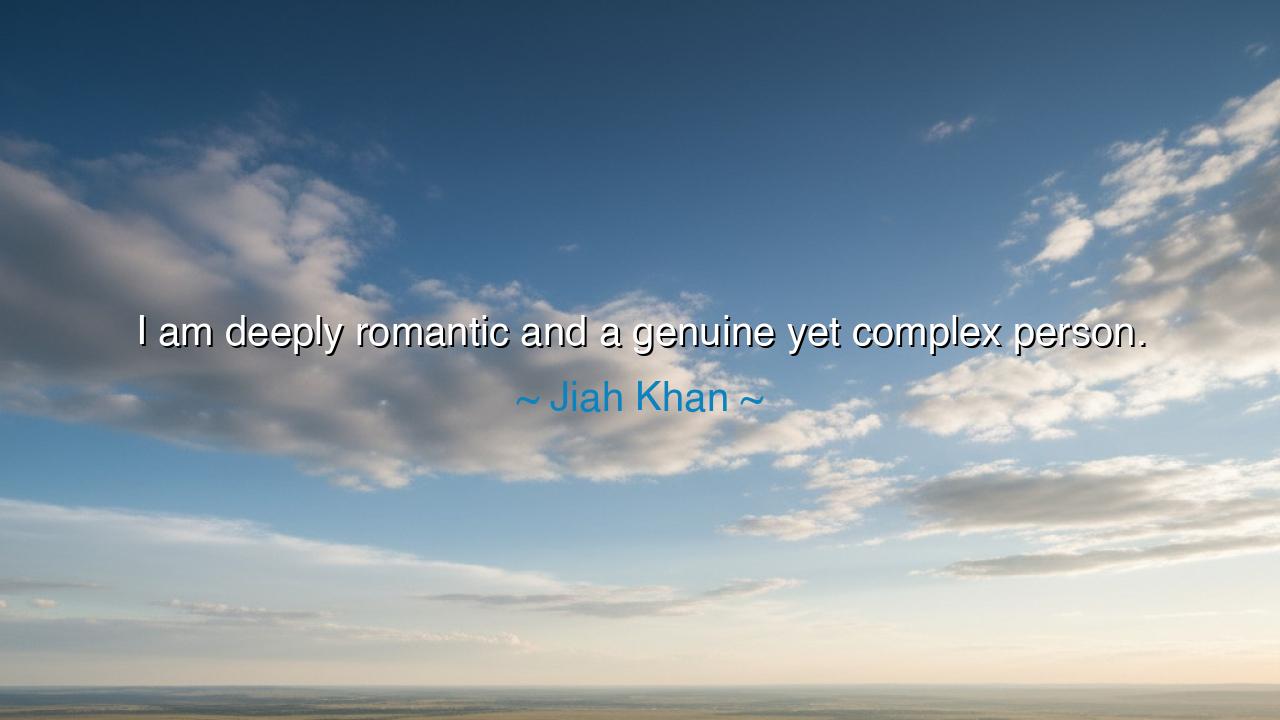
I am deeply romantic and a genuine yet complex person.






"I am deeply romantic and a genuine yet complex person." These words, spoken by Jiah Khan, unveil the profound essence of the human soul—where the forces of romance, genuineness, and complexity converge to create a being who is both accessible and enigmatic. Khan’s assertion is an acknowledgment of the depth that exists within every human heart, the mixture of simplicity and mystery that makes us uniquely human. To say one is deeply romantic is to recognize that love is not merely a fleeting emotion, but a force that shapes our very being, one that touches every aspect of our lives, like the ancient fires of passion that once burned brightly in the hearts of the gods.
In the ancient world, the most revered figures were often those who embodied romanticism and complexity. Take, for example, Orpheus, the legendary musician and poet of Greek myth. Orpheus’ love for Eurydice transcended the boundaries of life and death. In his grief and devotion, he descended into the underworld, seeking to rescue his beloved, only to lose her again due to his own impatience. His story is one of intense romantic passion mixed with tragic flaw—a perfect representation of the deeply romantic and complex nature of humanity. Orpheus, like Jiah Khan, embodies the genuine yet complicated nature of love: it is both pure and flawed, capable of lifting us to the heavens and tearing us apart.
In the same breath, Khan’s declaration that she is genuine speaks to the notion of truth and authenticity that has been revered in human thought for millennia. Socrates, the ancient philosopher, famously said, “Know thyself.” This simple but profound wisdom suggests that the most genuine individuals are those who embrace both their strengths and flaws, those who recognize the complexity of their nature and live it with honesty. To be genuine, as Khan describes herself, is to live openly, without pretense, yet also without surrendering the complexity that makes us whole. The challenge lies not in simplifying oneself, but in embracing the richness of one's nature, the contradictions that make each of us so uniquely human.
Consider the life of Cleopatra, queen of Egypt, whose romantic entanglements with Julius Caesar and Mark Antony were as politically shrewd as they were passionate. Cleopatra was deeply romantic, but she was also a woman of great complexity—a ruler who manipulated power and relationships for the survival of her kingdom. She was not just a lover, but a strategist; her genuine affection for those men was intertwined with the politics of her time. Her story demonstrates that even the most romantic figures can be deeply complex, their actions shaped by both personal emotion and the demands of their external world. Khan’s statement about her own nature echoes this, reminding us that romance does not always exist in isolation but can be entwined with the realities of life.
To claim that one is both romantic and complex is, in essence, to embrace the tension between emotion and intellect, between the ideal and the real. It is the acceptance that we are all a mosaic of contradictions. The romantic seeks beauty, connection, and transcendent love, while the complex person understands that love is not always idealistic or pure; it is fraught with struggle, decisions, and often, heartache. This understanding was captured by Dante in his Divine Comedy, where the poet’s journey through Hell, Purgatory, and Heaven reflects the complexities of the soul’s yearning for love while being entangled in the consequences of human sin. The romantic ideal and the harsh realities of life intersect in every human story, as they did in Dante's, and as they do in the journey of Jiah Khan.
The lesson that Khan offers us, in both her romanticism and her complexity, is one of balance. To be genuine is to accept all parts of oneself—the simple beauty of love and the chaos that love can create. Romanticism is not about a naive pursuit of perfect love, but an understanding that love exists even in the face of life's flaws. The ancient heroes knew this well: their lives were filled with both glory and suffering, their love for family and country often creating tensions that led to great deeds, but also tragic endings. Whether in the Iliad, where Achilles’ rage leads to his downfall, or in Romeo and Juliet, where love ultimately leads to death, romanticism is always intertwined with complexity.
In your own life, take a moment to embrace your own romanticism and complexity. Do not shy away from the parts of yourself that seem contradictory or difficult to understand. Instead, celebrate the tension between your ideals and the realities you face. Like Jiah Khan, let your genuineness be the foundation of your journey, and let your romanticism be the spark that guides you through the complexities of human connection. For it is through acceptance of our complexities that we are able to live fully, to love deeply, and to understand that our true strength lies in embracing every part of ourselves, from the light to the shadow.






AAdministratorAdministrator
Welcome, honored guests. Please leave a comment, we will respond soon